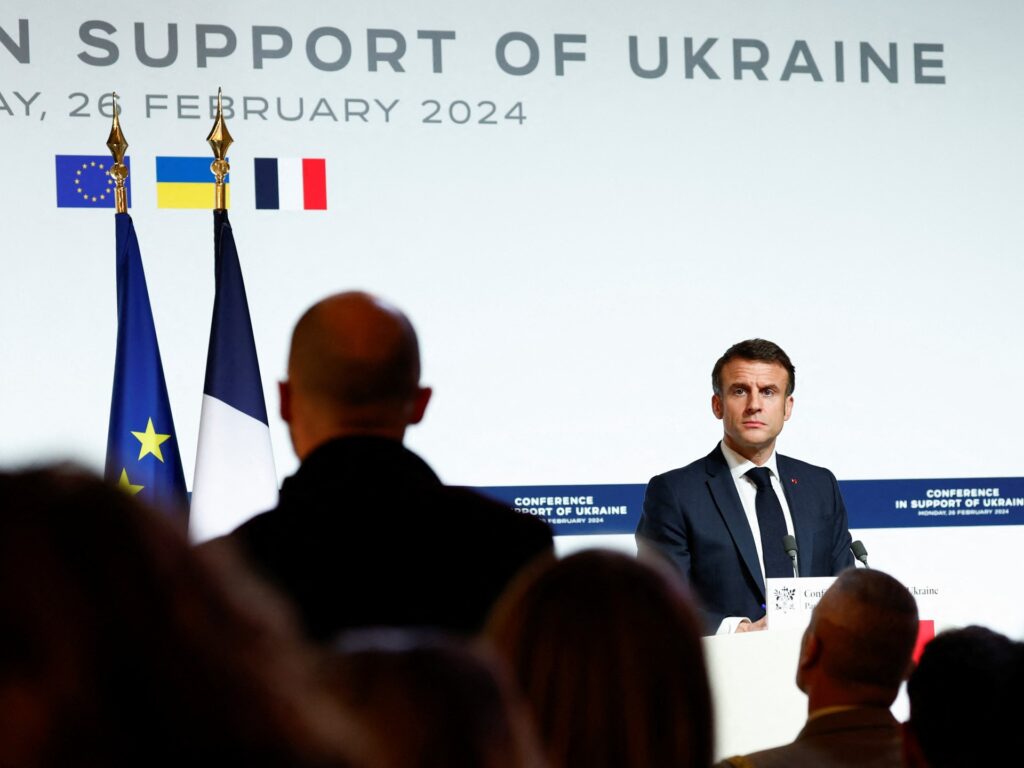Mr Stoltenberg's rebuttal to Macron's comments came as the Kremlin warned of provoking conflict if the West gained ground in Ukraine.
NATO's secretary general has said there are no plans to send troops to Ukraine as Russia insists it is ready for direct conflict with the Western military alliance should it set foot on the ground.
Reacting to French President Emmanuel Macron's remarks the previous day, Jens Stoltenberg on Tuesday denied that NATO countries were considering the possibility of sending troops to Ukraine amid a Russian invasion.
“There are no plans to send NATO combat forces on the ground in Ukraine,'' the NATO chief said.
President Macron told a European summit on Monday that “we do not have an agreement today to send troops on the ground in an officially authorized manner… but we cannot rule out anything.”
Russia was quick to pounce on the French leader's comments. Kremlin spokesman Dmitry Peskov said Mr Macron's proposal that Western countries could send ground troops to Ukraine was a “very important new element”.
That is “absolutely not in the interest” of Europe's NATO members, he told reporters. “In that case, we would need to talk about necessity rather than probability. [of direct conflict]”
Stoltenberg ruled out NATO military action, but reiterated that the alliance would continue to strongly support Kiev.
“This is Russia's war of aggression against Ukraine, in clear violation of international law.” “According to international law, Ukraine has the right to self-defense, and we have the right to help defend that right.”
“Nothing was ruled out.”
Macron was hosting European leaders in Paris when he made the remarks, and appears to be trying to position himself as a European champion of Ukraine's cause as US support wanes. .
NATO provides only non-lethal aid and support to Ukraine, but most alliance members send arms and ammunition bilaterally or collectively.
However, any decision to send troops would require unanimous support from all member states.
The French leader did not provide details about which countries were considering sending troops, citing “strategic ambiguity.”
“Today there is no agreement to send troops on the ground in an officially approved manner. But in terms of dynamics, nothing can be ruled out,” he said.
On Tuesday, French Prime Minister Gabriel Attal echoed those comments, saying: “Nothing can be ruled out in war.”
Ukraine welcomed this prospect. “This shows, first of all, that we are absolutely aware of the risks that a militaristic and aggressive Russia poses to Europe,” presidential aide Mykhailo Podoljak said on Tuesday.
But other countries moved quickly to defuse tensions.
In bilateral talks, Kiev's strongest supporters, Polish Prime Minister Donald Tusk and Czech Prime Minister Petr Fiala, said they were not considering sending in troops.
Sweden, which plans to join NATO, said it does not envisage sending ground troops to the war-torn country.
“It's definitely not on the cards at the moment,” Prime Minister Ulf Kristersson told Swedish public broadcaster SVT a day after his country cleared the final hurdle to joining the transatlantic military alliance.
Slovak Prime Minister Roberto Fico also said his government had no plans to propose sending Slovak soldiers. But the populist, who regularly uses pro-Russian rhetoric, acknowledged that some countries are considering whether Ukraine should strike a bilateral deal to prevent Russian aggression.

